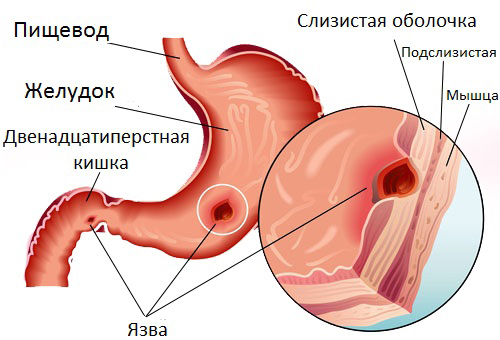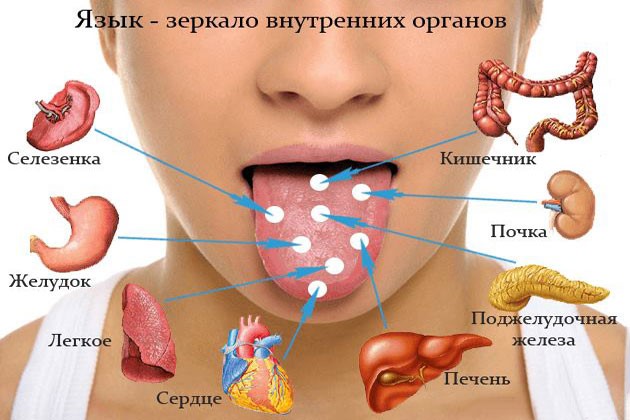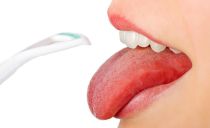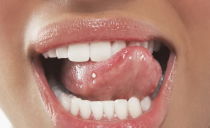Black coating on the tongue: types, causes, diagnostics
In a healthy state, the human tongue has a natural pink tint. Any deviations in color are a symptom of a malfunction in the body. Therefore, a black coating on the tongue in adults and children, as well as the reasons for its appearance, should not be ignored. It can be a sign of serious illness.
Content
What does a black plaque look like?
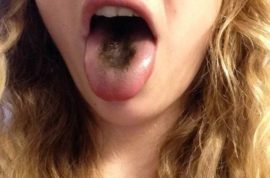 For all people, a dark coating on the tongue looks different. This can be a barely noticeable “ripple”, a black spot with clear boundaries (as in the photo), a small dot or a coating covering the entire organ. Inspecting the patient, the doctor can notice a change in pigmentation in any part: on the tip of the organ, in its lateral segments, near the root (closer to the throat).
For all people, a dark coating on the tongue looks different. This can be a barely noticeable “ripple”, a black spot with clear boundaries (as in the photo), a small dot or a coating covering the entire organ. Inspecting the patient, the doctor can notice a change in pigmentation in any part: on the tip of the organ, in its lateral segments, near the root (closer to the throat).
Often, darkening captures other parts of the oral cavity: spots and dots are found on the inner surface of the cheeks, upper palate, gums. Depending on the location, the doctor makes a conclusion about possible diseases - the location explains why a person has a black tongue, and helps to find the reasons. In addition to the location, the plaque and the intensity of the darkening influence the diagnosis.
When not to worry
 A black plaque accidentally discovered in the tongue could have arisen for a harmless reason. These include the use of:
A black plaque accidentally discovered in the tongue could have arisen for a harmless reason. These include the use of:
- drinks with dyes: the mucous membrane may darken from tea, wine, coffee, energy drinks;
- berries: blueberries, mulberries, bird cherry, honeysuckle;
- tinted candies;
- some types of seafood.
The tongue blackens even from ordinary activated carbon. Therefore, before looking for medical reasons for blackening the surface of the tongue, it is worth excluding household ones.
What is the symptom of a black plaque in the tongue?
The appearance on the surface of the mucous membrane of darkened foci and plaque can signal a malfunction in a variety of organs, systems. This happens when the liver is damaged due to alcohol abuse, when the body cannot cope with the timely removal of toxins, or when the immune system weakens after taking antibiotics: the fungus colonizes the oral mucosa, forming a plaque.
Such reasons "lie on the surface", so it’s easy to understand why the language turned black. Other cases require a more professional approach.
Gastrointestinal problems
Malfunctions in the gastrointestinal tract are the most common cause of the appearance of dark patches in the mouth in children. In adults, they are among the top three "leaders." Colitis, enteritis, the manifestation of peptic ulcer disease - all this can provoke blackening of the mucosa.
You can approximately determine the source of malaise by the location and shade of darkening:
- a black area in the middle of the tongue can mean inflammation of the pancreas;
- yellow spots with black stripes indicate gallbladder problems;
- uniform dark plaque - a symptom of a sick stomach;
- black spots with a blue tint can indicate Crohn's disease.
A doctor will help to cope with a gastrointestinal upset - an experienced gastroenterologist, at the stage of the initial examination, will pay attention to the black tongue and assume what symptom he is.
In addition to the treatment prescribed by the doctor in the case of intestinal diseases, a diet should become. Fresh pastries, carbohydrate foods, fast food, dishes with spicy additives are excluded from the diet.Proper nutrition allows you to quickly get rid of plaque.
Oral diseases
Find out why the tongue turned black, and a dentist or therapist can find the cause of this symptom. Already with a surface examination of the mouth, you can detect the following diseases:
- tonsillitis;
- pharyngitis;
- glossitis;
- candidiasis.
In the classic version, candidiasis manifests itself as a whitish coating on the mucous membranes. However, in advanced cases, the focus of a fungal infection may look like a black spot on the tongue.
All these diseases can cause blackening of the mucous membranes. The difference between their manifestations is that after brushing, plaque, stain or black dot on the tongue usually brightens, but this does not happen with diseases of the gastrointestinal tract.
What else to look for
If the black tongue after taking antibiotics or with an upset stomach is a familiar phenomenon, then reasons such as diet or dehydration often come as a surprise to patients. But prolonged fasting often explains why a black coating appeared on the tongue.
During the study of this problem, doctors found and confirmed several coincidences, on the basis of which a language diagnostic scheme was created. In the photo she looks like this:
According to this scheme, doctors can quickly determine why a person's tongue blackens, what treatment will be most effective. Not only the darkened areas and black coating are taken into account, but also the localization of cracks, bumps, ulcers, light plaque, and depressions.
If none of the above problems is confirmed, the doctor may suggest several more sources of plaque:
- hormonal failure due to illness, contraceptive use or age-related changes;
- immunodeficiency virus;
- lead poisoning;
- diseases of the respiratory system when the lungs, bronchi are affected.
In most cases, find out why the tongue has become black, and the doctor should treat the cause. The exception is situations when the plaque manifested itself under the influence of coloring food.
What to do if the tongue darkens
Having noticed that the tongue is blackened, the first thing to try is to thoroughly clean it from plaque using the back of the toothbrush (the area on which the silicone pads are applied) and rinse your mouth with clean water.
If the body has become lighter and no longer blackens, you do not need to do anything - the reason was the intake of colored food. If the tongue is still black, then a visit to the doctor is inevitable, even for adults.
Sometimes a dark coating on the tongue appears only in the morning, towards evening its surface brightens, and the person calms down. But the next day the situation repeats itself. Thus, the initial stage of Crohn's disease can manifest itself - a serious disease that requires immediate intervention by a specialist.
To parents! If the tongue darkens in the baby, then the introduced complementary foods are not suitable for him. In this case, it is necessary to return to full breastfeeding and already familiar products. In addition, if there is a raid, pediatricians advise to exclude thrush, if confirmed, treatment is prescribed for both the baby and the nursing mother.
Diagnosis: what awaits the patient
At the first call, the doctor will examine and prescribe the following studies:
 General blood test (prescribed to detect inflammation and bacterial infections).
General blood test (prescribed to detect inflammation and bacterial infections).- Blood chemistry.
- Coprogram.
- Gastro and colonoscopy.
- Back sowing saliva.
Studies can be assigned either individually or in combination.
Treatment
Therapy is prescribed in accordance with the nature of the disease diagnosed. There can be no single protocols here, the main goal is to get rid of the reason why the language turned black. Common to all patients are the requirements for hygiene, diet, lifestyle.

